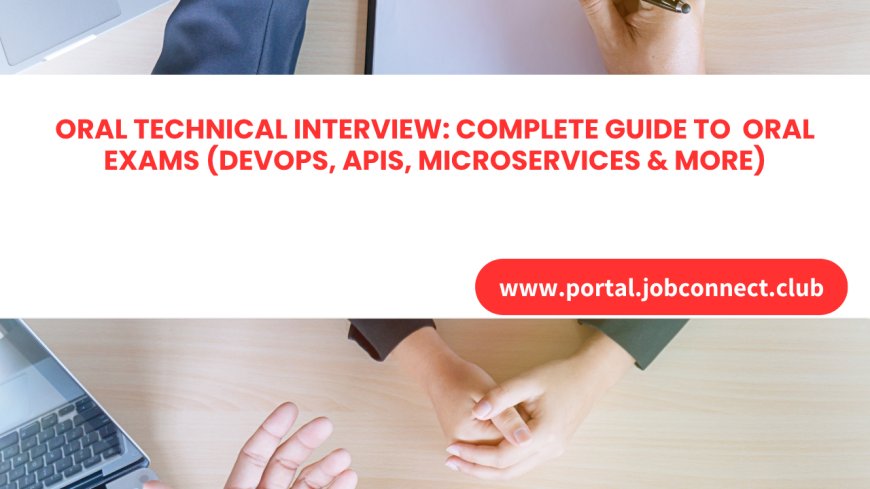Technical Interview: Complete Guide to Oral Exams (DevOps, APIs, Microservices & More)
oral exams with expert answers on CI/CD, Microservices, API security, Spring Boot, and Kubernetes. Includes real-world examples and code snippets.

Oral Interview Questions & Answers
(Oral Exam Preparation)
1. DevOps & CI/CD
Q: Explain the impact of CI/CD in your work.
A:
"CI/CD automates testing and deployment, reducing human errors and accelerating delivery. In my projects, it enabled:
-
60% faster release cycles
-
Early bug detection via automated tests
-
Seamless rollbacks when failures occur"
Q: How does DevOps help developers?
A:
"DevOps bridges development and operations through:
-
Collaboration: Shared ownership of deployments
-
Automation: Eliminates manual repetitive tasks
-
Feedback loops: Real-time monitoring improves code quality"
2. Architecture & Design Patterns
Q: Microservices vs Monolithic architecture?
A:
| Microservices | Monolithic |
|---|---|
| Independent deployable units | Single codebase |
| Better scalability | Simpler debugging |
| Tech diversity allowed | Tight integration |
Q: Which design pattern would you use for complex software?
A:
"Depending on requirements:
-
Domain-Driven Design (DDD): For business logic complexity
-
CQRS: When read/write operations scale differently
-
Observer Pattern: For event-driven systems"
3. Core Programming Principles
Q: Explain SOLID principles.
A:
-
Single Responsibility: One class = one purpose
-
Open/Closed: Extendable without modification
-
Liskov Substitution: Child classes replace parents
-
Interface Segregation: Avoid bloated interfaces
-
Dependency Inversion: Depend on abstractions
Q: Purpose of constructors?
A:
"Constructors initialize objects:
-
Parameterized constructors set initial state
-
Default constructors provide fallback values
-
In C#,
static constructorsinitialize class-level data"
4. API Development
Q: How to implement API security?
A:
-
Authentication: JWT/OAuth 2.0
-
Authorization: Role-based access control (RBAC)
-
HTTPS: Encrypt data in transit
-
Input validation: Sanitize all inputs
-
Rate limiting: Prevent DDoS attacks
Q: Optimizing slow APIs with DB bottlenecks?
A:
-
API Level:
-
Pagination (
LIMIT/OFFSET) -
Caching (Redis) for frequent queries
-
-
Database Level:
-
Indexing critical columns
-
Query optimization (avoid
SELECT *) -
Connection pooling
-
5. Frameworks
Q: Security in Spring Boot?
A:
-
Spring Securityfor auth (OAuth2, JWT) -
CSRF protection
-
Password hashing via
BCryptPasswordEncoder -
@PreAuthorizefor method-level security
Q: Explain MVC.
A:
"Model-View-Controller separates concerns:
-
Model: Data/business logic
-
View: Presentation layer (UI)
-
Controller: Handles user input and updates model/view"
6. Containerization
Q: Kubernetes basics?
A:
"Kubernetes orchestrates containers by:
-
Managing deployments via
pods -
Auto-scaling with
HorizontalPodAutoscaler -
Service discovery via
kube-dns -
Self-healing failed containers"
7. Personal Project Discussion
Q: Tell us about yourself and a project.
A:
"I’m a [Your Role] specializing in [Tech Stack]. Recently, I built [Project Name] using:
-
Tech: C#/ASP.NET Core, Microservices
-
Challenge: Scaling authentication service
-
Solution: Implemented JWT with Redis cache
-
Impact: Reduced auth latency by 40%"
8. Advanced Concepts
Q: Synchronous vs Asynchronous Tasks?
A:
-
Synchronous: Blocks execution until completion (simple but inefficient for I/O)
-
Asynchronous: Non-blocking (e.g.,
async/awaitin C#) improves throughput